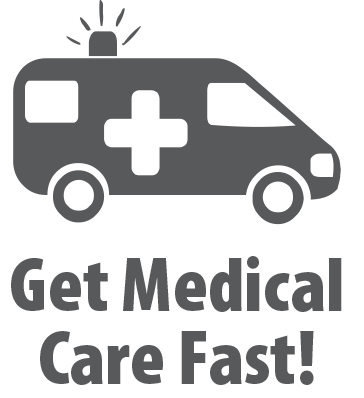Abdominal & Urinary Conditions
Vomiting & Nausea
Signs & Symptoms
• Vomiting is throwing up the stomach’s contents. Dry heaves may precede or follow vomiting.
• Nausea is when you feel like you’re going to throw up.
Causes
• Viruses in the intestines. Eating spoiled food or eating or drinking too much.
• A side effect of some medications, such as certain antibiotics.
• Motion sickness. Morning sickness in pregnant females.
• Labyrinthitis. This is inflammation of an area in the ear. Often, a respiratory infection causes this.
• Migraine headaches.
• Acute glaucoma.
• Stomach ulcers.
• A blockage in the small or large intestine (bowel).
• A concussion from a head injury.
• Hepatitis.
• Meningitis. This is inflammation of membranes that cover the brain and spinal cord.
Questions to Ask
Question
01
With vomiting, do you have any of these problems?
• Any heart attack warning sign.
• One or more symptoms of meningitis.
• You vomit true, red blood or material that looks like coffee grounds.

Get medical care without delay. If symptoms are life threatening go to the ER or call 9-1-1. Don’t call 9-1-1 or use the ER if symptoms do not threaten life. Ask your doctor ahead of time where you should go for a problem that needs prompt care, but not emergency care.
x
Question
02
With vomiting, do you have any of these problems?
• Sudden, severe pain in and around one eye, blurred vision, headache, and you see rainbow-colored halos around lights.
• Fainting or decreased level of consciousness.
• A head or abdominal injury happened a short time ago.

Get medical care without delay. If symptoms are life threatening go to the ER or call 9-1-1. Don’t call 9-1-1 or use the ER if symptoms do not threaten life. Ask your doctor ahead of time where you should go for a problem that needs prompt care, but not emergency care.
x
Question
03
Do you have signs of dehydration?

Get medical care without delay. If symptoms are life threatening go to the ER or call 9-1-1. Don’t call 9-1-1 or use the ER if symptoms do not threaten life. Ask your doctor ahead of time where you should go for a problem that needs prompt care, but not emergency care.
x
Question
04
Do you have symptoms of a kidney infection?

Get medical care without delay. If symptoms are life threatening go to the ER or call 9-1-1. Don’t call 9-1-1 or use the ER if symptoms do not threaten life. Ask your doctor ahead of time where you should go for a problem that needs prompt care, but not emergency care.
x
Question
05
Does very bad stomach pain last for more than 2 hours, interfere with daily activities, and keep hurting even after you vomit?

Get medical care without delay. If symptoms are life threatening go to the ER or call 9-1-1. Don’t call 9-1-1 or use the ER if symptoms do not threaten life. Ask your doctor ahead of time where you should go for a problem that needs prompt care, but not emergency care.
x
Question
06
With vomiting, do the whites of your eyes or does your skin look yellow?

You should be seen by your doctor for medical advice. Contact your doctor or health care provider to find out how soon you should be seen.
x
Question
07
With vomiting or nausea, do you have symptoms of a urinary tract infection?

You should be seen by your doctor for medical advice. Contact your doctor or health care provider to find out how soon you should be seen.
x
Question
08
With nausea or vomiting, do you have ear pain or a feeling of fullness in an ear?

Call your doctor or health care provider and state the problem. He or she can decide what you should do.
x
Question
09
In a baby or small child, has the vomiting lasted 2 to 6 hours? For others, has the vomiting lasted longer than 12 hours without getting better?

Call your doctor or health care provider and state the problem. He or she can decide what you should do.
x
Question
10
Are you taking medicines that don’t work if you vomit? High blood pressure pills are examples. Or, could you be pregnant?

Call your doctor or health care provider and state the problem. He or she can decide what you should do.
x
Self-Care / Prevention
For Vomiting
• Don’t smoke, drink alcohol, or take aspirin.
• Don’t eat solid foods. Don’t drink milk.
• Drink clear liquids at room temperature (not too hot or cold). Good examples are water; sport drinks, such as Gatorade; diluted fruit juices; ginger ale, etc. Take small sips. Drink only 1 to 2 ounces at a time. Stir carbonated beverages to get all the bubbles out before you sip them. Suck on ice chips if nothing else will stay down. {Note: For children, contact your child’s doctor about using over- the-counter (OTC) mixtures, such as Pedialyte.}
• Gradually return to a regular diet, but wait about 8 hours from the last time you vomited. Start with foods like dry toast, crackers, rice, and other foods that are easy to digest. Or, eat foods as tolerated. Avoid greasy or fatty foods.
For Nausea Without Vomiting
• Drink clear liquids. Eat small amounts of dry foods, such as soda crackers, if they help.
• Avoid things that irritate the stomach, such as alcohol and aspirin.
• For motion sickness, use an over-the-counter medicine, such as Dramamine. You could also try Sea-Bands, a wrist band product that uses acupressure on a certain point on the wrist to control motion sickness. Sporting goods stores and drugstores sell Sea-Bands.
Resources
Foodsafety.gov

Download an offline pdf file.
RELATED ARTICLES
<
>
2021 © American Institute for Preventive Medicine - All Rights Reserved. Disclaimer | www.HealthyLife.com








